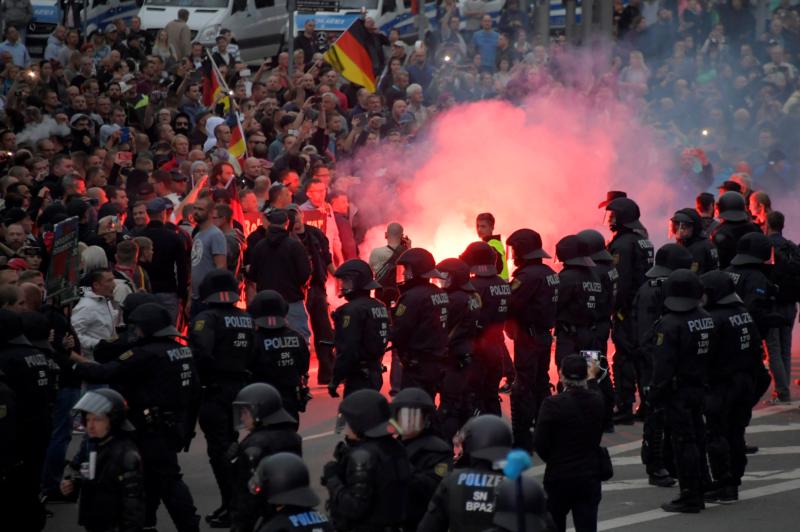
German riot policemen stand guard during a protest Aug. 27 in Chemnitz after a man was stabbed to death. German church leaders condemned anti-immigrant riots in Chemnitz, which erupted after a German man was killed in a brawl with migrants. (CNS photo/Matthias Rietschel, Reuters)
WARSAW, Poland (CNS) — German Catholic leaders condemned anti-immigrant riots in an eastern Germany town that erupted after a German man was killed in a brawl with migrants.
“This deadly stabbing is a criminal offense which needs clearing up and sanctioning by the rule of law. It can never justify xenophobic, inhuman mass demonstrations,” Bishop Heinrich Timmerevers of Dresden-Meissen told KNA, Germany’s Catholic news agency, Aug. 28.
“From a Christian perspective, violence cannot be an answer to violence. An offense must not be utilized to incite anger against entire ethnic groups,” the bishop said.
[hotblock]
Riots Aug. 26-27 in Chemnitz left at least 20 seriously injured when police failed to separate 6,000 right-wing protesters from a smaller counter-demonstration.
Meanwhile, the president of the German bishops’ conference urged Christians to counter “nationalism, injustice and the restriction of freedom” with “vigilance and political action.”
“We have to look at how people speak, how some nations fall back into nationalism, and how warlike language is trumpeted again,” Cardinal Reinhard Marx of Munich and Freising said during Mass Aug. 26 in Munich’s St. Kajetan Church, KNA reported.
“As Christians, we know where we have to stand. The Catholic social gospel must be applied to concrete historical times, with its fundamental principles of human dignity, freedom, justice for all and commitment to peace and reconciliation,” Cardinal Marx said.
Police said the riots were sparked when a 35-year-old German was stabbed early Aug. 26 following a street festival in Chemnitz, 120 miles south of Berlin. An Iraqi-born man and a Syrian-born man face charges in connection with the killing.
The minister president of Saxony, Michael Kretschmer, told the Deutsche Welle broadcaster Aug. 29 the mood had been inflamed by “xenophobic comments, false information and conspiracy theories” posted on social media by right-wing groups, including Germany’s anti-Muslim Pegida movement.
The riots, which German Chancellor Angela Merkel criticized as “mob-like,” were the latest of several xenophobic incidents mainly in poorer eastern Germany, where the Christian Democrat-led government has been widely criticized for accepting migrants and refugees from war-torn countries in 2015 and 2016.
The rector of Chemnitz’s St. John Nepomucene Church, Father Clemens Rehor, told the Catholic church’s Dom Radio Aug. 28 a much larger right-wing rally had taken place in the city in May, adding that the causes of the latest violence were “not yet fully understood.”
“We are trying to respond, explaining to people they are loved by God and should also love each other, but there are very few Christians here,” Father Rehor said.
“Although there are good initiatives and spiritual communities are doing as much as possible, our 6,000 Catholics have a relatively weak voice in a population of 247,000.”
PREVIOUS: Irish parishes hear about New Zealand model for Catholic Church renewal
NEXT: Philippine immigration officials reaffirm move to deport missionary nun


Who provoked the violence? Father Clemens Rehor says that the causes of the latest violence were “not yet fully understood.”
Most of the time, the violence is provoked by leftist counter-protesters.
Anti-Immigrant violence? Xenophobia? Has Catholic Philly lost their minds or just has no grasp on reality or any knowledge of history.
Islam is not and never has been a “religion of peace.” It is an ideology of war.
This latest so-called refugee crisis is a planned invasion. Where once Christian Armies held back the Gates of Vienna, today they are now welcoming them as “immigrants” and putting them on welfare while the Saudis build mosques. The violence and unrest is staggering. This is “hijra,” a planned invasion to take over Europe. It is already well under way, perhaps not even stoppable at this point.
Sharia law is incompatible with freedom and democracy. Your ignorance here is staggering. Talk about #FAKENEWS
Europeans are finally rising up in defense of their own countries. But with the population decreasing (except among Muslims) their days are numbered.
America needs to see what is happening and wake up.
AS I write more than 80 Muslims are seeking higher office in America.
This is a recipe for disaster. One only needs to see what Muslim-run towns in Europe look like, let alone areas like Dearborn, MI and places in Minnesota.